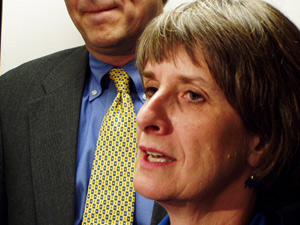Audio
Photos
More from MPR
| ||||||||||||||||||||||||||||||||||||
May 4, 2005
A spending plan that would pump $622 million of new money into public schools has cleared the Minnesota House. After six hours of debate, lawmakers passed the K-12 education finance bill Wednesday night on a 70-63 vote. Schools haven't seen a funding increase in three years, but critics say the bill falls far short of the actual need.
St. Paul, Minn. — The $12.6 billion House package provides the first increase in state education funding since 2002, roughly $622 million in new money. Most of the aid would be added to the basic per-student payment to schools. That number, which was frozen for three years, would increase by 3 percent each of the next two years.
Rep. Barb Sykora, R-Excelsior, who chairs the House Education Finance Committee, says the bill provides an excellent boost.
"This is actually the second and third largest amount of dollars put into education ever. So this is, considering where we're at, quite good," says Sykora.
The House bill also provides $84 million to help a limited number of school districts switch to a new system for paying teachers. The "Q-Comp" system proposed by Gov. Pawlenty would base teacher salaries on classroom performance rather than years of service. Early childhood education and gifted and talented programs also get more funding.
Rep. Mark Buesgens, R-Jordan, chairman of the House Education Policy Committee, says the bill challenges schools to do better. "Minnesota's public schools are second to none in the nation. This bill before you today does nothing but strengthen that reputation. But it also doesn't let us sit on our laurels and say we're good, we're very good, we don't have to do anything else," says Buesgens.
The legislation also provides for another $122 million in potential revenue, which would come from local property taxes. School districts throughout the state would gain new authority to raise taxes to cover special education and maintenance costs. Rep. Tom Rukavina, DFL-Virginia, took issue with the bill's reliance on property taxes.
"You can pretend in this bill that you're helping. I hope the public really figures this out -- that this is nothing more than letting us raise our own property taxes," Rukavina says. "Well governor, and thank you, members on the other side of the aisle. It's pretty easy to find somebody's money when it's in somebody else's pocket."
A series of DFL amendments fell on 67-67 votes. They included: a call for Minnesota to rebuke the federal No Child Left Behind law even if the state loses federal aid; a proposal to help pay for expanded all-day kindergarten programs; and a move to direct money from Gov. Tim Pawlenty's teacher pay reform program to give all schools more strings-free funding.
DFLers also say the bill doesn't do enough to make up for three previous years of funding freezes.
Rep. Connie Bernardy, DFL-Fridley, says school districts will still face budget cuts and teacher layoffs.
"It reminds me of a bee hive. There is some honey in the bill, but our students and our schools are going to get stung," says Bernardy. "It gives our communities and our students little hope that the cuts will stop. It offers no hope that our local property tax increases will stop."
Bernardy and other Democrats are counting on a House-Senate conference committee to eventually come up with a larger funding increase.
The DFL-controlled Senate is poised to approve a K-12 finance plan that would outspend the House bill by $63 million. But a coalition of education organizations this week described the Senate bill as also providing inadequate resources for school districts. Other noteworthy provisions have nothing to do with money.
One would allow officials to revoke the driver's license of high schoolers who are habitually truant. Another would encourage schools to emphasize character development, such as truthfulness, diligence, patience, peacemaking and forgiveness. A third would let school boards offer rewards to tipsters who provide information on crimes against students, school staff or school property.
(The Associated Press contributed to this report)






